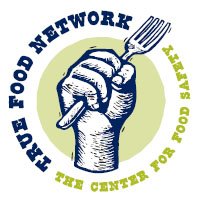Free Range Studios created this short video to support Prop 2, and you can even see Hillary Duff say four words I never expected to hear pass her lips--"Center for Food Safety"--in another supporting video.
What is a Factory Farm? The government calls these facilities Concentrated (or Confined) Animal Feeding Operations (CAFOs). The Environmental Protection Agency (EPA) defines a CAFO as “new and existing operations which stable or confine and feed or maintain for a total of 45 days or more in any 12-month period more than the number of animals specified” in categories that they list out. In addition, “there’s no grass or other vegetation in the confinement area during the normal growing season.”
According to the EPA, a large CAFO includes 1000 cattle (other than dairy, which is 700), 2500 hogs over 55 pounds, or 125,000 chickens (as long as a liquid manure system isn’t used). A liquid manure system is when the animal’s urine and feces are mixed with water and held either under the facility or outside in huge open air lagoons - these manure systems create a lot of pollution (which many times taxpayers end up paying for). The chickens they refer to are chickens other than laying hens – laying hens must number between 30,000 - 82,000, depending on how the manure is handled.
A medium factory farm (CAFO) has between 300-999 cattle other than dairy (200-699 if dairy), 750-2,499 hogs if 55 pounds or more, and 37,500 to 124,999 chickens (other than hens that lay eggs) if the facility doesn’t use a liquid manure handling system.
Factory farms cut corners and drive family farmers out of business when they put profits ahead of animal welfare and our health. Factory farms have put our health at risk by keeping animals in overcrowded, inhumane conditions. Cramming tens of thousands of animals into tiny cages fosters the spread of animal diseases that threaten human health. Low doses of antibiotics are administered regularly to animals in a preemptive move to ward off the diseases bred by unnatural, unsanitary conditions. In fact, an estimated 70 percent of all antibiotics used in the United States are regularly added to the feed of livestock and poultry that are not sick—a practice with serious consequences for our health; Bacteria that are constantly exposed to antibiotics develop antibiotic resistance. This means that when humans get sick from resistant bacteria, the antibiotics prescribed by doctors don’t work. In addition to preventive medicines, animals are fed hormones and antibiotics to promote faster growth.
Factory farming also hurts our environment and rural communities. The American Public Health Association has called for a moratorium on new factory farms because of the devastating effects these operations can have on surrounding communities. Factory farms often spread waste on the ground untreated — contaminating our waterways, lakes, groundwater, soil, and air.
Prop 2 is sponsored by the Humane Society of the United States, the Center for Food Safety, and the California Veterinary Medical Association. For more information on Prop 2, visit the Yes on Prop 2! website.


No comments:
Post a Comment